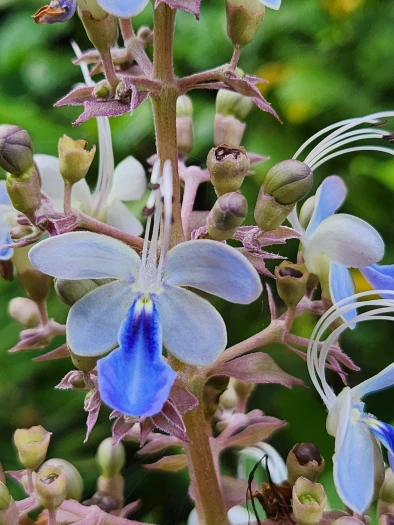Blue Fountain Bush
(Rotheca serrata)
Blue Fountain Bush (Rotheca serrata)
/
/

© deepachandran
CC BY-SA 4.0
Image By:
© deepachandran
Recorded By:
Copyright:
CC BY-SA 4.0
Copyright Notice:
Photo by: © deepachandran | License Type: CC BY-SA 4.0 | License URL: http://creativecommons.org/licenses/by-sa/4.0/ | Uploader: deepachandran | Publisher: iNaturalist |
















Estimated Native Range
Climate Requirements for Novi, Michigan
| This Plant | Your Site | Plant Suitability for Your Location | ||
|---|---|---|---|---|
| • Precipitation | 21" - 241" | 32" | Your precipitation may be insufficient for this plant. Irrigate N" / year. | Irrigate N" / year |
| • High Temp. | 66°F - 109°F | 83°F | Your summer temperatures are normal for this plant. | Excellent |
| • Low Temp. | 33°F - 74°F | 16°F | Your winter temperatures may be too cold for this plant | Too cold |
This plant should grow well at your location with about N inches per year (Y minutes per month) of irrigation.
Summary
Rotheca serrata, commonly known as the blue fountain bush, blue-flowered glory tree, or beetle killer, is a deciduous shrub native to open woodlands and forest edges in India, Sri Lanka, and Southeast Asia. It typically grows up to 8 feet tall and wide, with squarish, sparsely branched stems and hairless oval serrated leaves arranged in opposite pairs or whorls of three. The plant is notable for its showy flowers, which bloom in cymes covered with short, soft erect hairs, forming erect pyramidal panicles up to 10 inches long. Each flower features a striking blue cylindrical corolla with four upper lobes that spread flat and a concave lower lobe, blooming primarily in the summer months. The fruit is a four-lobed fleshy drupe that transitions from green to black as it ripens.
In cultivation, Rotheca serrata is valued for its ornamental flowers and is often used in tropical and subtropical gardens as a specimen plant or for mixed borders. It thrives in full sun to part shade and prefers well-drained soil with moderate moisture. While it is relatively easy to maintain, it may require protection from frost in cooler climates. This plant has medicinal uses in Ayurveda, particularly for treating snake bites, and may also have insecticidal properties, hence the common name "beetle killer." Gardeners should be aware that it can be susceptible to root rot if overwatered or planted in poorly drained soils.CC BY-SA 4.0
In cultivation, Rotheca serrata is valued for its ornamental flowers and is often used in tropical and subtropical gardens as a specimen plant or for mixed borders. It thrives in full sun to part shade and prefers well-drained soil with moderate moisture. While it is relatively easy to maintain, it may require protection from frost in cooler climates. This plant has medicinal uses in Ayurveda, particularly for treating snake bites, and may also have insecticidal properties, hence the common name "beetle killer." Gardeners should be aware that it can be susceptible to root rot if overwatered or planted in poorly drained soils.CC BY-SA 4.0
Plant Description
- Plant Type: Shrubs
- Height: 6-10 feet
- Width: 4-6 feet
- Growth Rate: Rapid
- Flower Color: Blue, Purple, White
- Flowering Season: Summer, Fall
- Leaf Retention: Evergreen
Growth Requirements
- Sun: Full Sun, Part Shade
- Water: Medium
- Drainage: Medium
Common Uses
Border Plant, Butterfly Garden, Low Maintenance, Potted Plant, Showy Flowers
Natural Habitat
Open woodlands and forest edges
Other Names
Common Names: Butterfly Clerodendrum , Blue Glory Bower
Scientific Names: Rotheca serrata , Clerodendrum bracteosum , Clerodendrum cuneatum , Clerodendrum divaricatum , Clerodendrum farinosum , Clerodendrum farinosum var. pubescens , Clerodendrum grandifolium , Clerodendrum herbaceum , Clerodendrum herbaceum , Clerodendrum hexangulare
GBIF Accepted Name: Rotheca serrata